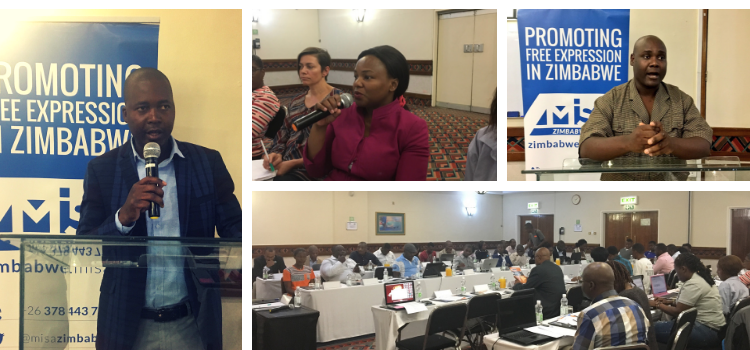We, Zimbabwean journalists, editors and media practitioners, having gathered at a post-2018 elections review conference organised by the Media Institute of Southern Africa (MISA Zimbabwe) with the support of Konrad Adenauer Stiftung (KAS);
Reaffirming that professionalism is essential in preserving media integrity and credibility;
Upon deliberations anchored on three thematic areas on media freedom and professionalism, editorial independence and the safety of journalists;
Hereby resolve and implore:
- President Emmerson Mnangagwa to prioritise holistic media law and policy reforms.
- Maintain momentum and pressure on the call for the repeal of the Access to Information and Protection of Privacy Act (AIPPA) and Broadcasting Services Act (BSA): #AIPPAMustFall! #BSAMustFall!
- The government to implement the recommendations of the 2014 Information and Media Panel of Inquiry (IMPI).
- Reinforce compliance with the Voluntary Media Council of Zimbabwe’s (VMCZ) Code of Conduct.
- Engage publishers, editors and the VMCZ to address the thorny and controversial issue of journalists that participate in elections as candidates in order to protect the integrity of the profession.
- Maintain an alliance-based approach in advocacy for media freedom and protection of citizens’ rights to free expression and access to information.
- Increase and maintain pressure on the urgent need for transformation of the Zimbabwe Broadcasting Corporation (ZBC) into a truly independent public broadcaster.
- Support professional bodies such as the Zimbabwe National Editors Forum (ZINEF) in defence of media professionalism.
- Address the issue of corruption in the media to protect the integrity of the profession.
- The government and its security arms, as well as political parties, to prioritise the safety of journalists.
- Demand an end to impunity on crimes and violence against journalists.
- Engage the military in view of the media violations that occurred in Harare on the 1st of August 2018.
- Maintain engagements with the Zimbabwe Republic Police in implementing the December 2017 media/police resolutions.
- Urge media training institutions to fine-tune journalism training curriculums to suit industry and market needs.
- Promote the participation of women in decision making positions in the media industry and ensure that they are remunerated on the same scales as their male counterparts.
End









